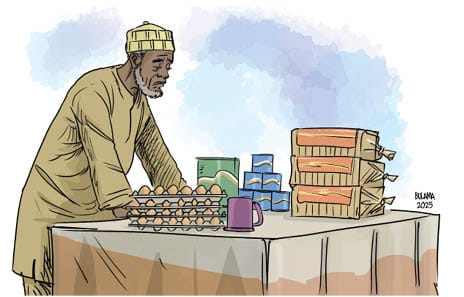News
Mai Shayi: Cost Of Eggs, Bread, Push Nigerians To Cheaper Options

In most bustling capital cities across the country, including the Federal Capital Territory (FCT), tea vendors, popularly known as mai shayi, have continued to serve their communities, even as mounting economic challenges have reshaped their trade.
Once a thriving and accessible business across Abuja’s slums, tea vending has become increasingly difficult, with inflation and fuel price hikes driving up the cost of basic commodities.
Many vendors said they had remained in the business out of habit and necessity, while customers insisted they relied on the vendors for affordable meals and daily convenience. Yet, with rising costs threatening profits and reducing patronage, the sustainability of this community-based trade as many often term the trade now hangs in the balance.
For decades the “mai shayi” business, which is the Hausa term for tea seller, is a huge, and to some extent, culturally rooted micro-economic enterprise sector in the northern part of Nigeria, and by extension, other parts of the country.
However, a recent development has revealed that the business is not just about tea but a full social and economic ecosystem that has been transforming lives.
Despite the inflation rate, operators of the business have managed to keep the business going.
IMai Shayi is a street-food vendor who serves hot tea, bread, eggs, noodles, and recently, spaghetti, as well as other quick meals, usually at night or early morning.
History has shown that the micro business has been in operation for a very long time. And findings have shown that the business has added value to families and individual’s lives across the country. Weekend Trust spotlights the issues.
Abuja mai shayi decry low patronage as rising costs bite
Tea (mai shayi) vendors operating in the FCT are decrying low patronage amid cost of production in their fast food business.
Salisu Maishayi Maradi, a tea vendor from Niger Republic who operates in the Kpadna slum of Utako District, Abuja, noted that tea business had sustained him despite growing challenges.
He opens by 8am daily and closes at noon, with youths and middle-aged men forming the bulk of his customers. According to him, women are less frequent buyers as many of them prefer to purchase bread and prepare tea at home.
Reflecting on the profitability of the trade, Salisu said, “It was more profitable some years ago when things were cheaper. Back then, we could multiply profits because customers didn’t know the actual prices of ingredients. Now, everyone is aware, and prices have skyrocketed. We have continued because the business has become part of our lives.”
He said starting the tea business today would require at least N50,000, compared to just N5,000 20 years ago when profits were higher.
He added that many people patronised tea vendors daily not out of poverty but habit and convenience.
“Some people are addicted to shayi. With N500 you can get tea outside, but preparing it at home costs more,” he added.
‘Mai shayi providing community service’
Muhammad Ibrahim, a regular customer, likens tea vendors to community service providers, especially for newcomers to the city.
“For us working in Abuja, shayi vendors help a lot. In the morning, before food vendors open, you can get tea and noodles. At night, when food vendors close, tea sellers are still there. They save us from going to bed hungry.”
Ibrahim lamented rising costs, noting that three years ago, a cup of tea cost N100 and bread N100, but today, tea is N200 and bread N300 or more. Noodles that once sold at N250 now costs N700, while larger packs with eggs cost between N1,300 and N1,500.
He attributed the surge to fuel price hikes, which have driven up food production costs.
Despite this, Ibrahim said he continued to patronise tea vendors because shayi is a light meal suitable at any time. He noted that most customers were aged 40 and below.
Another vendor, Ismail Alhassan from Kano State, described the business as increasingly difficult.
“Sometimes sales are brisk in the evening, sometimes in the morning. Years ago, I could sell five cartons of noodles in a day. Now selling half a carton is hard. Customers who once ate noodles twice daily now switch to rice or yam because they are cheaper.”
Ismail estimated that starting a tea business today would require at least N100,000, but his long experience allows him to manage with less.
He recalled beginning his trade 15 years ago, shortly after President Umaru Musa Yar’adua’s death with just N20,000. At the time, a bag of sugar cost N3,000 and he could afford cartons of milk, Lipton and 20 to 30 cartons of noodles.
However, despite rising costs, Alhassan still finds the business profitable, especially if one is not burdened with heavy responsibilities.
According to him, tea vending demands resilience, explaining, “Lazy people can’t do this job. You must be tough because some customers will owe you and refuse to pay. Sometimes you have to fight to get your money.”
Ismail added that many customers no longer bought noodles and tea due to high prices, further dwindling vendors’ profits.
Another vendor, Mustafa A. Rufai, who operates in Kubwa town in the FCT, said patronage declined since fuel subsidy withdrawal was declared, which he noted resulted to the rise in the prices of commodities used in the business.
“Most of my customers can no longer afford to include milk in their tea, while those that ask for noodles hardly include eggs anymore. Some no longer patronise us,” he noted.
He also noted that due to low patronage and high cost of commodities, he no longer stocks his shed with all the necessary items needed by customers, while those he could afford are in a limited number. “For some of the items, I wait until a customer requests before I rush to get them,” he added.
Speaking on patronage, Rufai disclosed that he averagely used 2 cartons of noodles in a day, compared to less than half a carton he currently uses. “Most customers that ask for noodles buy a single Hungry Man pack that costs N800, instead of 2 super packs that cost N600 each.
“For bread, I used to receive supply from three different bakeries, totalling 30 loaves, but now, I hardly receive eight loaves from all the three bakeries put together,” he lamented.
Ilyasu Abdullahi, another tea vendor, said most of his customers hardly include egg in their order, a situation that has reduced the patronage of eggs to only half crate, compared to the three crates he used to sell in the past on a daily basis. He said that these days, most of the customers would consume tea without milk.
“The worse aspect of the business now is the fraud customers engage in. Many disguise as potential customers, place an order, and after being served, they disappear without paying,” he lamented.
Abdullahi called on the government to include tea vendors in their empowerment schemes to enable them survive what they term trying times in the business.
David Bojo, a one-time customer, said he had since taken a break from tea vendors, which used to be his favourite place in the past. “I am just relaxing here. My breakfast these days is usually on simple things like okpa, fried sweet potato and other lower cost commodities.”
Similarly, in Ilorin, Kwara State, patronage is said to be low. It was observed that the early morning sight of vendors carrying large trays of tea and bread has reduced.
A tea seller, Abdullahi AbdulHamid, who said he started the business in 2015 after relocating to Ilorin, told Weekend Trust that earnings have continued to decline despite spirited efforts.
According to him, the rise in the prices of staple foods, such as rice, beans and garri has not translated into increased patronage or made customers shift to tea. Instead, the situation has worsened.
He said their business was among the worst hit because the surge in food prices also reflects in the cost of beverages and other items used for their services.
AbdulHamid said a cup of tea that previously sold at N100 now costs N250. With two eggs at N600 and bread worth roughly N300, a basic combination now costs over N1,150.
“That is our dilemma. Instead of spending that much, customers can get rice worth N300 or N400 and be okay,” he said.
He added that their core customers were ordinary community members who struggle economically.
Another vendor, Mallam Idrissu, lamented that the country’s economic situation had taken a heavy toll on their business.
Idrissu, who said he began the business with noodles before adding tea and bread, lamented that a carton of noodles that previously cost N2,500, is now N7,000, while the bigger carton goes for N13,000.
He has now introduced guinea corn pap (koko) as an alternative for customers, he said.
“A big cup of koko is N200 with sugar; and it fills up most of my customers, especially commercial motorcycle operators more than a cup of tea,” he said.
He recalled that he used to sell more than two big cartons of noodles daily, but now, he barely finishes half.
“I used to sell four crates of egg in a day, but now, I sometimes struggle to sell a crate in four days. The same applies to beverages. I used to finish tins daily, but now, even a roll of sachets is difficult,” he added.
A regular customer, Danladi Adamu, who said he had been patronising the business, noted that N500 used to be enough for a cup of tea, bread and egg, but he now spends over N1,000 for the same meal.
“So, I can’t afford to take it twice or more a day as I used to. My earnings can’t sustain that anymore,” he said.
Another customer, Mudashiru Ibrahim, said he had cut down on tea expenses and now prefers staple foods that are more filling and would last him a longer period for the day.
“We now consider tea a luxury,” he added.
Mai shayi business thrives in Lagos, Ogun
Interestingly, however, checks by Weekend Trust revealed that the mai shayi business, which is mostly associated with young men from northern Nigeria, has continued to thrive in Lagos, Ogun and other parts of southern Nigeria.
Over the years, familiar roadside tea joints have become an integral part of daily life for residents, students, traders, commercial motorcyclists and labourers.
In the bustling Agege area of Lagos, Isiyaka Abdulkadir, popularly known as Easy, has become a household name. His tea spot is strategically located along the popular Alfanla Street, a major route linking Oniwaya junction to Oke-Koto.
Speaking with Weekend Trust, the Niger-born indegene said, “When I arrived in Lagos, I began by working under a mai shayi master. That was where I learned everything. After graduating, I opened my own tea joint with his guidance.
“Today, I thank God that I have also trained many young boys who now work under me and are learning the trade.”
Abdulkadir said the business was far more profitable years ago when the cost of ingredients was low, explaining that with rising inflation, profit margins have reduced drastically.
“Before now, one could buy items cheap and still sell at low prices while making good gain, but today, everything is expensive. And you cannot increase your prices too much because customers are always complaining. People don’t have money like before,” he added.
He said one of his unique selling points was his menu. Unlike many mai shayi who focus mainly on noodles, bread and eggs, Abdulkadir has diversified and now cooks yam and stew, which attracts many customers. His emphasis on cleanliness and neatness also makes his tea joint a preferred destination.
He noted that his busiest hours were early morning and late at night, with customers drawn from both the indigenous Agege community and migrants, particularly young men who live alone and rely on affordable meals.
In Sagamu, Ogun State, Abdurahman Muhammed also noted that he used to be a furniture maker before venturing into tea business. He moved to the area because of his furniture business, which he had practised for over 15 years in Kano and Jigawa states. He specialises in producing high-quality bedroom and kitchen furniture for newly-wed couples, particularly northerners living in Sagamu. However, upon settling in the town, he sought a business that could guarantee daily income with minimal start-up capital. This led him back to the mai shayi trade he already knew well.
“I started the mai shayi business here in Sagamu three years ago. I found a strategic location near a public toilet and a lodge with enough space for okada riders to park. The place gathers not less than 200 okada riders at a time. People were surprised that someone like me would start a tea joint, but I knew what I was doing.”
Muhammed revealed that the business had been highly rewarding, noting that he makes at least N5,000 profit on every carton of noodles, and he sells a minimum of five cartons daily. This is in addition to smaller profits from bread, eggs and tea.
“We make more money from tea because it is water-based, and water is cheap or sometimes free. That increases our profit,” he explained.
Like Abdulkadir, he also acknowledged the fact that rising prices of commodities had affected profits being made from the business. Another major challenge is customers who buy food on credit, saying he is trying to manage them because of the economic situation in the country.
“But there is a limit to this. Some of our loyal customers will eat, whether they have money or not. You cannot refuse a hungry person who trusts you. But if you don’t have strong capital, the business will suffer,” he said.
According to him, the mai shayi trade is flexible, affordable to start and reliable for daily income generation.
“With between N50,000 and N200,000, depending on your target, you can start this business. I have boys who assist me. When I am on the site working on furniture, they run the tea joint,” he said.
Despite inflation, business thrives in Kano
Aminu Dankaka, who said he had been in the business for over two decades, noted that it had witnessed a series of transformation and accommodated many people, as well as providing a sustainable source of income to many families.
He said the business had survived several economic huddles, such as high cost of sugar, flour, amongst other ingredients, but noted that he was able to build his house and acquire some properties, while also sustaining his family’s daily needs.
“I built my house with proceeds from this tea business. I was able to train my children in school. Currently, my eldest son is a teacher and his two brothers are currently working after completing their education,” he revealed.
He further said the business had witnessed some form of transformation from hot Lipton, Highland or Top Tea with milk and sugar, bread with fried or boiled eggs, to modern joints that include noodles and egg, coffee, cocoa or chocolate drinks, yoghurt and soft drinks, spaghetti, rice, toast and sandwich.
However, for Aminu Umar, a 30-year-old tea seller, the business has accorded thousands of young men a means of livelihood. According to him, the sector has absorbed many school leavers and migrants from rural areas in Kano State. He explained that for many, it is the first step into entrepreneurship.
“There are many people who have made it big in their business pursuit, starting off as tea sellers. The business, to a larger extent, serves as the first step to becoming an entrepreneur,” he said.
For Sule Sani, another tea seller, the business witnessed an increasing number of operators. According to him, with the recent development in the sector, the business that requires a capital of less than N15,000 now requires N150,000 and above to set up a tea point, depending on size and location.
He explained that to start a tea joint, one needs items like a table, kettle or a big pot, cups, stove, bread, eggs, milk, sugar, tea noodles and spaghetti, among others. He said that for a successful tea joint daily turnover on average stands at N15,000 to N25,000 in areas where patronage is high or when the weather is favourable, especially during the harmattan season.
It was gathered that a normal cup of black tea, which initially sold at N10, is now N100. And due to the high cost of noodles, tea sellers have resorted to the use of spaghetti instead of noodles.
Malam Ibrahim Umar, a civil servant who takes tea daily, said operators of the business had been serving the public a great deal. He said that if one had to prepare tea at home, it would cost more, but it would be cheaper at the tea joint as tea with bread, and at times, butter goes for as low as N600.
Another tea consumer, Idris Bello, said sellers usually provided solace for many, adding that their tea tables serve as meeting points for people to meet, discuss politics, football or news. He said expanding cities and student populations meant more customers for tea sellers.
“Believe it or not, without tea sellers, a lot of people will on many occasions go to bed on empty stomachs despite having the means to buy food. It is only the tea sellers that usually stay long through the night and are easily accessible at almost every time, especially during the fasting period. They are a source of solace to many people, especially those that are single,” he said.
Similarly, some tea sellers said some of the challenges they faced were regulation and harassment from government officials over levies, eviction in urban centres, as well as lack of organisation because most of the vendors operate without formal and accreditation by unions, a situation that makes them vulnerable to shocks and all forms of business threats.
Another source told our reporter that the only time tea sellers were recognised and considered was in 2017 when the then state government gave N208 million grants to support 5,200 tea sellers
However, according to a Kano-based analyst, Malam Habib Ishaq, tea business has been informal but has contributed to the state’s economy through provision of jobs and maintaining a strong value chain that managed and maintained many people. According to him, the consumption of sugar, milk, eggs and other items required by tea sellers addresses various financial challenges.
In Borno, tea sellers said there was rapid reduction in the number of people patronising them in Maiduguri and environs.
In a chat with Weekend Trust, many of them attributed the sudden withdrawal of customers to the economic hardship currently being experienced in the country, and cost of tea spices, sugar and other ingredients.
One of the tea sellers in the Bulunkutu area, Idris Mustapha, said that many people had stopped patronising him.
He said, “Unlike before, a number of my customers now prefer to do their tea at home because tea ingredients are very expensive nowadays. And customers are not willing to adjust.
“As it is now, we can hardly meet their expectations in terms of rich taste. For instance, sugar is too costly and they always complain that the tea is tasteless.
“But many of them can’t afford the charges if I put enough sugar in the tea. You also need tea bags, lemon grass, ginger, cloves and other spices to give them a perfect taste,” he explained.
He said many tea sellers had resorted to using artificial sweeteners (saccharine) in order to satisfy the sugar taste of their customers.
“That has contributed to why people are running away from street tea vendors now,” he said.
For Ibrahim Dauda, who has been in the business for over 20 years at Gomari bus stop, Maiduguri, the economic situation is responsible for the decrease in the number of people patronising his business.
“People like tea but they don’t have money to buy. Before now, with N300 one could drink tea with milk and bread, a mixture that even N1,000 can’t buy today,” he said.
He also said that lack of enough capital had forced many sellers out of the business, and for the few of them sustaining the business, the cost of bread and the beverages is affecting them seriously.
“What we need now is for the government to intervene, provide us with capital and reduce the cost of goods.
“As at the last two years, I would not have time for this interview around this time because of the traffic of customers coming to buy tea. But, look at it now, we spent over 30 minutes and only one person came to buy bread,” he said.
Another tea seller at Bakin Kasuwa, Suleiman Mohammed, said the decrease in the number of buyers could not be quantified.
He said, “Majority of our customers are young men, but many of them have migrated due to economic challenges. Now, very few people are coming to buy tea from us.
“Another thing is the cost of the ingredients. Before now, with N600 one could buy milk tea and bread, a rich mixture that even N1,500 cannot afford now.
“That is why many people are going for food substitutes like fura da nono, fried sweet potatoes, akara, yam and other cheap snacks instead of tea.”
He lamented that bread sellers had refused to reduce the price of the commodity or improve its quantity and quality despite crash in the price of flour.
“Many customers are complaining about the cost of bread despite the continued reduction in the price of flour in the market,” he said. (Daily trust)
-

 Metro11 hours ago
Metro11 hours ago‘I Was In The Wilderness For 42 Days After Paying N17Million Ransom’ – Ekiti Farm Manager Narrates Kidnap Ordeal
-

 News11 hours ago
News11 hours agoBanditry: Over 300,000 Displaced In Niger – Bago
-

 News11 hours ago
News11 hours agoNo attempt to poison Tinubu – Presidency
-

 News11 hours ago
News11 hours agoTinubu convenes Police Council today to confirm Disu
-

 Politics11 hours ago
Politics11 hours agoINEC Can’t Guarantee Perfect Election In 2027 – Amupitan
-

 News11 hours ago
News11 hours agoIran: IGP Orders Heightened Surveillance In North
-

 Business11 hours ago
Business11 hours agoAbu Dhabi directs hotels to extend guests’ stay over travel restrictions, says it’ll cover cost
-

 Metro11 hours ago
Metro11 hours agoKidnapped Ondo Man Killed, Found Dead In Edo Forest After Ransom Payment


















